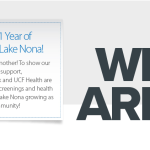We all know about taste receptors on the tongue. But did you know other organs also “taste” sugars or even artificial sweeteners through the same receptors? Dr. George Kyriazis, Investigator at the Florida Hospital Translational Research Institute for Metabolism and Diabetes (TRI-MD) and Assistant Professor at the Sanford Burnham Prebys Medical Discovery Institute (SBP) in Orlando, is an expert in extra-oral sweet taste receptor function. In one of his studies, Kyriazis investigated how taste receptors interact with the gut microbiome to affect glucose metabolism in the body after chronic consumption of artificial sweeteners. His work is leading to a proof-of-clinical concept research study looking at adults (18-45 years) in good general health and stable weight who do not currently consume artificial sweeteners.
Integrative Metabolism Program
Regularly consuming artificial sweeteners increases the chance that you will gain weight and develop type 2 diabetes, but it’s not clear yet whether saccharin, aspartame, and other non-caloric sweeteners directly alter metabolism. If they do, figuring out the molecular basis for their effects could lead to new ways to treat obesity and prevent metabolic problems. Toward that goal, the lab of George Kyriazis, PhD, recently did experiments in people that measured the immediate consequences of a substance that acts to block the receptors that sense sweeteners.
These receptors, called sweet taste receptors, are located on our tongues and are responsible for our enjoyment of tasting sugars and artificial sweeteners. But they’re also found in the gastrointestinal tract, which might help regulate metabolism.
To figure out whether sweet taste receptors in the gut directly affect blood sugar control in humans, Kyriazis’s team had 10 non-obese volunteers drink either water or water containing lactisole, a food additive that inhibits sweet taste receptors – the opposite effect from that of artificial sweeteners. Surprisingly, lactisole increased the amount of insulin released when the participants drank a glucose solution a few minutes later.
“This is the first evidence that sweet taste receptors could regulate acute metabolic responses in humans during the ingestion of glucose,” says Kyriazis, senior author of the study, published in the American Journal of Clinical Nutrition. “While these results don’t directly tell us how and whether artificial sweeteners or sweet taste receptors contribute to obesity and diabetes, we’re currently exploring their long-term effects using mice.”
Experiments in mice and human cells show that activating sweet taste receptors makes cells in the intestine secrete hormones called incretins, which amp up production of insulin.
“Surprisingly, in the human study, lactisole had no effect on incretins,” says Kyriazis. “That means sweet taste receptors are affecting the pancreas by some other means. We hope to gain further insight on that using animal models. We’re also having healthy subjects consume lactisole for a few weeks to understand the long-term metabolic impact of targeting sweet taste receptors.”
Kyriazis has been awarded the Polak Young Investigator Award by the Association for Chemoreception Sciences in honor of this pioneering research.


